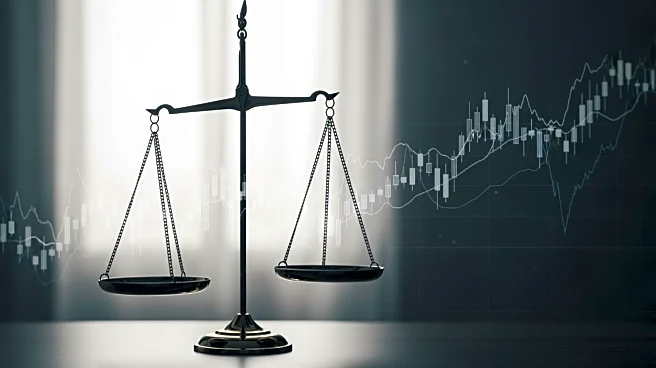What's Happening?
The U.S. Supreme Court recently heard oral arguments regarding President Trump's tariffs, which have been challenged in lower courts for overstepping legal authority. During the hearing, several conservative justices joined their liberal colleagues in expressing
skepticism about the broad powers claimed by the Trump administration under the International Emergency Economic Powers Act. This act was used to justify imposing tariffs on imports, a move critics argue infringes on Congress's power to tax. Prediction markets, such as Kalshi and Polymarket, reacted to the justices' tone, with contracts tied to the court's ruling on Trump's tariffs dropping significantly. Traders now see a reduced likelihood of the Supreme Court upholding the tariffs, reflecting growing uncertainty about the administration's trade policy.
Why It's Important?
The Supreme Court's decision on President Trump's tariffs could have significant implications for U.S. trade policy and the balance of power between the executive and legislative branches. If the court rules against the tariffs, it may limit the president's ability to unilaterally impose trade measures, reinforcing Congress's role in taxation and trade regulation. This could impact U.S. relations with trading partners and influence future administrations' approach to international trade. The uncertainty reflected in prediction markets highlights the potential economic ramifications, as businesses and investors await clarity on trade policies that affect import costs and market dynamics.
What's Next?
The Supreme Court has not yet issued a decision, leaving stakeholders in anticipation of the ruling's impact on trade policy. Depending on the outcome, there could be shifts in U.S. trade strategy, with potential adjustments to tariffs and negotiations with trading partners. Political leaders and businesses are likely to respond to the court's decision, which could prompt legislative action or influence future executive decisions on trade. The timing of the ruling remains uncertain, adding to the unpredictability faced by industries reliant on international trade.
Beyond the Headlines
The case raises broader questions about the scope of presidential powers in economic matters and the legal frameworks governing trade policy. A ruling against the tariffs could set a precedent for limiting executive authority in imposing economic measures, potentially leading to more collaborative approaches between the executive and legislative branches. This could also influence public discourse on the balance of power in government and the role of legal checks in shaping policy.















